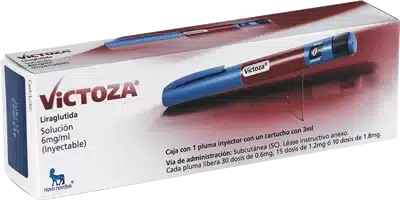Victoza 6mg Injection contains the active ingredient liraglutide, which is a glucagon-like peptide-1 receptor agonist (GLP-1 RA). It is formulated as a subcutaneous injection and is used in the management of type 2 diabetes mellitus. Liraglutide mimics the action of endogenous GLP-1 hormone, which regulates blood sugar levels by stimulating insulin secretion and inhibiting glucagon release.
Uses:
- Type 2 Diabetes Mellitus: Victoza Injection is indicated for the treatment of type 2 diabetes mellitus in adults, either as monotherapy or in combination with other antidiabetic medications.
- Cardiovascular Risk Reduction: In addition to glycemic control, Victoza has been shown to reduce the risk of major adverse cardiovascular events (MACE) in patients with type 2 diabetes and established cardiovascular disease.
Mechanism of Action:
Liraglutide activates the GLP-1 receptors on pancreatic beta cells, leading to increased insulin secretion in a glucose-dependent manner. It also inhibits glucagon secretion, thereby reducing hepatic glucose production. Additionally, liraglutide slows gastric emptying and promotes satiety, which can result in weight loss.
Dosage and Administration:
- The recommended dosage of Victoza Injection is 0.6 mg, 1.2 mg, or 1.8 mg once daily, administered subcutaneously into the abdomen, thigh, or upper arm.
- The dosage may be titrated based on the patient’s response and tolerability, with the maximum recommended dose being 1.8 mg daily.
Side Effects:
Common side effects of Victoza Injection may include:
- Nausea, vomiting, or diarrhea.
- Headache.
- Hypoglycemia (low blood sugar), particularly when used in combination with other antidiabetic medications.
- Injection site reactions such as redness, swelling, or itching.
- Weight loss, which may be desirable in some patients but may also indicate the need for dose adjustment.
Precautions:
- Victoza Injection should be used with caution in patients with a history of pancreatitis, as it may increase the risk of pancreatitis.
- Monitor renal function regularly, especially in patients with renal impairment, as liraglutide is predominantly excreted via the kidneys.
- Use with caution in patients with a history of thyroid disease, as liraglutide may affect thyroid function.
When Not to Use:
Victoza Injection should be avoided in patients with:
- Type 1 diabetes mellitus or diabetic ketoacidosis.
- Known hypersensitivity to liraglutide or any components of the injection.
FAQs (Frequently Asked Questions):
- How does Victoza Injection compare to other antidiabetic medications?
- Victoza Injection offers unique benefits such as weight loss and cardiovascular risk reduction in addition to glycemic control. However, its use should be individualized based on patient characteristics and treatment goals.
- Is Victoza Injection suitable for use in children with type 2 diabetes?
- Victoza is not approved for use in pediatric patients with type 2 diabetes mellitus. Consult a pediatric endocrinologist for appropriate treatment options in children.
- Can Victoza Injection be used during pregnancy or breastfeeding?
- Victoza Injection should not be used during pregnancy or breastfeeding due to insufficient data on its safety in these populations. Consult a healthcare provider for alternative treatment options.
- Does Victoza Injection require refrigeration?
- Victoza Injection should be stored refrigerated between 36°F to 46°F (2°C to 8°C) until first use. After first use, it can be stored at room temperature (below 86°F or 30°C) for up to 30 days.
- Can Victoza Injection be used in patients with a history of cardiovascular disease?
- Yes, Victoza Injection has been shown to reduce the risk of major adverse cardiovascular events (MACE) in patients with type 2 diabetes and established cardiovascular disease.






Reviews
There are no reviews yet.